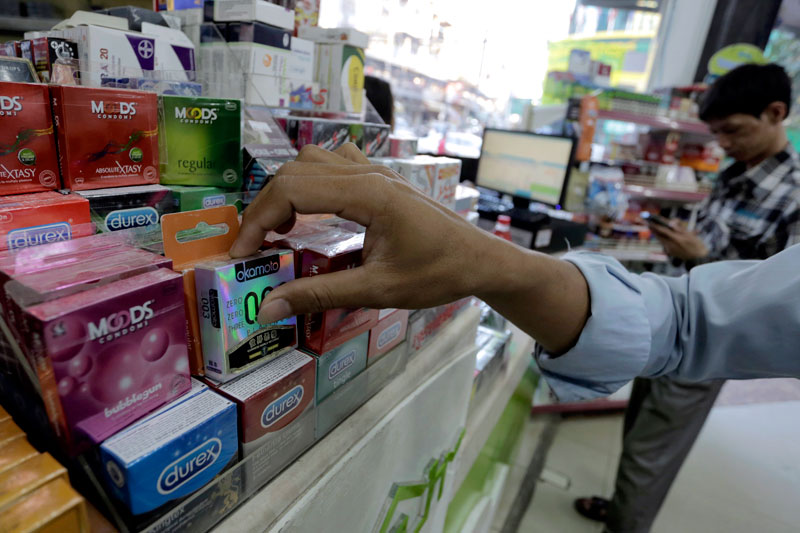When Phnom Penh was flooded with free condoms during the Water Festival last week—a public health push to ensure revelers who came for days of debauchery did so safely—the city’s condom vendors weren’t happy about it.
“During the Water Festival, my company got almost no orders from guesthouses because most of the customers who came to Phnom Penh got free condoms from the NGOs,” said Kem Vichet, director of PPES Group, the local distributor of Yoi condoms.

But the Water Festival is a once-a-year event, and other private companies in the condom sector say the government bodies and health NGOs who distributed condoms for free last week have also been helping the for-profit condom market take off.
The global health organization Population Services International (PSI), whose local operations are now called Population Services Khmer (PSK), controls the majority of the condom market with its heavily subsidized condom brands Number One and OK. Though the organization still offers condoms for free, it has sought to encourage people to get in the habit of buying condoms, starting at rock-bottom prices, as donor money that has long funded free prophylactics starts to dry up.
And their efforts appear to be working.
For Full Well Trading, the official distributer of Okamoto condoms, the last two years have seen the company’s share of the non-subsidized condom market increase from 30 to 50 percent, positioning the company as the leader in the private sector.
The market has been driven by higher incomes and changing attitudes toward condoms, largely due to educational campaigns by NGOs and the government, said Full Well sales manager Oueng Veasna.
“Before, women used to rely on their partner to go and buy condoms. But now they are more confident to go in a shop and buy them without having to be shy and whisper to the shop assistant,” he said.
Mr. Veasna said the company sells about 1.3 million condoms a year, up from less than a million two years ago. Though a sizeable amount, he said, the firm’s sales pale in comparison to what he estimated was PSK’s distribution of 20 million condoms—both free and subsidized—per year.
“With the private sector growing and PSI’s presence, the market has become very competitive,” he said.
But Mr. Veasna said PSK’s strategy of introducing affordable condoms for the masses has enabled many consumers to transition to buying commercial varieties, slowly creating a sustainable market.
Suresh Krishnan, owner of Dhanam Enterprise, which distributes Moods condoms, estimates the condom private sector is growing at a rate of about 30 percent per year. About two years ago, he was selling only 1,000 condoms per month. Now he is selling some 20,000 a month.
The expanding private sector has also seen the entrance of some unregistered and unsafe brands, according to Mr. Krishnan, who estimated there are currently about nine unregistered brands being smuggled into the country, outnumbering registered varieties, which he estimated at eight.
Marie-Odile Emond, UNAIDS country coordinator, said the developing private sector is a strong indication the demand for condoms is increasing, which is crucial at a time when aid from major health organizations is being scaled back as Cambodia makes major strides in reducing HIV/AIDS infection rates.
“There are less condoms freely available, though they can still be bought cheaply from NGOs. But a lot more people buy them in pharmacies and that is becoming more acceptable because there is no shame or fear like before and income levels have been increasing,” Ms. Emond said.
“Competition among private companies is good as it keeps prices down, but the next challenge is to see whether the government can take over from NGOs, amid external aid declining, and identify and distribute contraception to the poor.”



